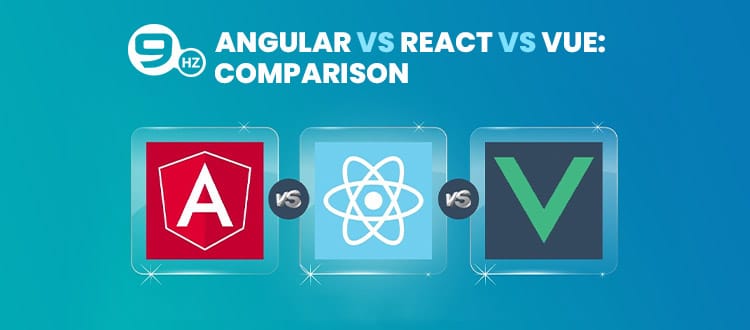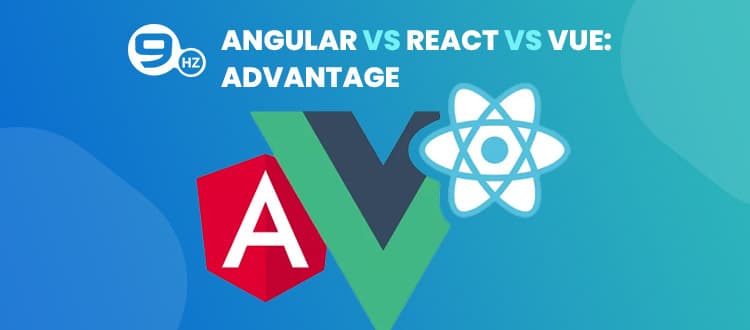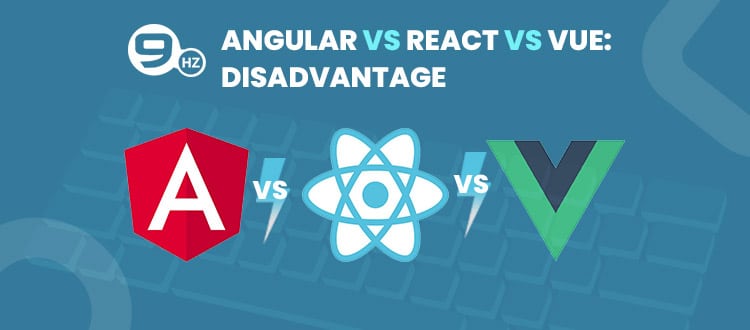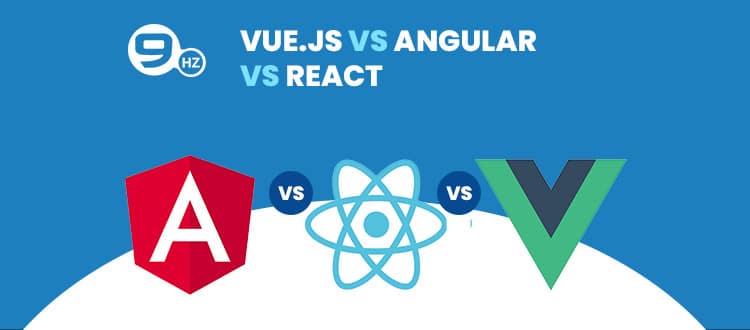Vue.js Vs. Angular Vs. React | A few years ago, the chief point of debate among web developers was whether to use Angular or React as the JavaScript framework for their projects. However, since a couple of years ago, another contender has joined this race. Developers have increasingly portrayed a growing interest in another JavaScript framework called Vue.js.
This growing popularity is evidence enough to showcase how good Vue.js has turned out to be. But the question remains: is it better than Angular or React? So if you are a developer torn out between these three options for your new project, then this article is for you! To find an answer to this question, a comprehensive comparison of the three is imminent.
In this guide, we will draw a comparative analysis of Angular, React, and Vue by covering the various aspects of each. And in the end, we will try to draw a valid conclusion as to which JavaScript frameworks win in the Angular vs React vs Vue race.
But before we proceed to compare the three based on different parameters, it is crucial to understand the basics of the individual frameworks. So let’s get started!
Vue.js Vs. Angular Vs. React: Which is Better & Easy to Learn?
To see if Vue.js is better than Angular and React, a comparison with all the technical details understands their basics. So, before we get into the details, let us learn about the frameworks and their histories.
About Angular
Angular is one of the most popular open-source front-end development JavaScript frameworks available in the market today. It is a single framework designed to build applications for both mobile and desktop and possesses all the components essential for building a robust app and packs in an extensive range of features. Angular is primarily used to build dynamic single-page apps (SPA).
How it all started
Google develops angular, the original author being Miško Hevery, and was first released in 2010. It is thereby the oldest JavaScript framework in this discussion. The first version of Angular is called Angular JS. The second version was launched in 2016 and went by just Angular. Even though AngularJS still gets updates, the version relevant to our present discussion is Angular. Its latest stable version, Angular 11, was released in November 2020.
Used by: Google, Wix, LinkedIn, Freelancer, PayPal, Lego
About React
React is also an extremely famous JavaScript framework, which is considered one of the best and most efficient frameworks for developing fast & responsive front-end apps. It enjoys a vast global community and support from Facebook and is known for its flexibility, saturated environments, and reusable components. It can be the best choice for developers for cross-platform or SPA projects.
How it all started
React was launched in 2013, originally authored by Jordan Walke and developed by Facebook. Naturally, a lot of Facebook products use React. The current stable version of the framework is 17.X, which was released in October 2020.
Used by: Facebook, Instagram, Whatsapp, Netflix, Uber, Salesforce, Asana
About Vue
Vue.js is another leading open-source front-end development JavaScript framework. It is known for its reactive component system and enables developers to build robust & dynamic user interfaces. Vue.js is a highly progressive and adaptive framework that can add and use JSX, CSS, and Typescript alongside HTML.
How it all started
Originally authored and developed by ex-Google employee Evan You and initially launched in 2014, Vue.js or Vue is the youngest of the three. Being the youngest has provided it with certain benefits as it has learned a great deal from Angular and React on its way. The current stable version of Vue is Vue 3.0 that was released in September 2020.
Used by: Alibaba, GitLab, Xiaomi, Adobe, Trivago, Grammarly
Vue.js Vs. Angular Vs. React: Comprehensive Comparison

A comprehensive comparison of the three – Vue.js Vs. Angular Vs. React– can only be possible if we consider their characteristics across specific parameters, such as license, size, load time, components, learning curve, and popularity. Defining each framework against these set parameters will enable us to determine the better option among the three in a more standardized way.
License: React Vs. Vue.js Vs. Angular
The particular license used by a specific framework has profound implications. That is why it is critical to go through the license before you choose any open-source framework. The same goes for JavaScript frameworks like Angular, React, and Vue. Interestingly enough, all these three JavaScript frameworks use the same license – the MIT license, which offers minimal restriction on reuse. So, as far as license goes, all three – Angular, React, and Vue – are the same from a developer’s perspective.
Size and Load Times
The size of the frameworks varies, although not massively. In production, angular, React, and Vue are 167 KB, 109.7 KB, and 30.67 KB, respectively. The exact sizes in development are 1.2 MB, 774.7 KB, and 279 KB, respectively. Being comparatively the largest, Angular has a lengthier load time than Vue, which is the smallest among the three. There are also the sizes of the libraries of each, but they aren’t such significant factors as caching and minimization have become standard practices.
Components: Vue.js Vs. Angular Vs. React
The comparison between the components of the three frameworks is extremely critical as the components are the most integral parts of all the frameworks. But what are these components? A component is a minor part of a framework that changes its behavior based solely on its input. The changed component then manifests itself in the UI of the page and makes reusing codes much more effortless. Check comparison Vue.js Vs. Angular Vs. React:
- Angular: The components in Angular are referred to as directives, which can be tracked and attached with specific behaviors. In Angular, the UI part of the components remains separated as HTML tags’ attributes, while their behaviors remain in the form of JavaScript codes. This nature of the components in Angular sets it apart from the other two frameworks.
- React: Unlike Angular, React combines the UI and the behavior of its components. That is, the same part of the code remains responsible for creating the UI and specifying its behavior.
- Vue: In this case, Vue is much more similar to React. In Vue, too, the UI and the behavior remain the parts of its components. But Vue being easily customizable allows the combination of the UI and the behavior from within a script and makes it more intuitive.
Learning Curve: Angular vs React vs Vue.js
Learning curve refers to the ease with which a framework can be learned. It is an important parameter when comparing the three as each has its difficulty level and is compatible with beginner developers differently—as such, being the easier one will give them an upper hand in the race of Angular vs React vs Vue.js.
Learning Curve of Angular
The learning curve of Angular is quite steep. It is a complete framework, and to master Angular entirely, a developer would need to have a clear understanding of related concepts like MVC and Typescript. As a result, it can take some time to learn Angular, especially if you are new in the field.
Learning Curve of React
React has a less steep learning curve when compared to that of Angular. One of the primary reasons behind this is that React isn’t a complete framework, unlike Angular. Also, the framework comes with a Getting Started guide that can help even less-experienced developers set up React in a couple of hours. Additionally, the framework offers thorough and almost complete documentation, which accompanies pre-defined solutions to some of the more common issues. The requirement of third-party libraries for using the advanced features further provides a smoother learning curve when chosen.
Learning Curve of Vue
On the other hand, Vue’s learning curve is way much most effortless among the three. It is incredibly beginner-friendly due to its higher customizability, flexibility, and simplicity. Not only that, transitioning to Vue from either Angular or React is significantly easy since they have similarities in certain functionalities.
Also Read: AngularJS Vs ReactJS
Migrations: Angular Or React Or Vue.js
Migration from one version to another is another critical aspect to consider between the three. As a developer, you would want a framework that provides efficient continuity and doesn’t mess up with your code with every new update. So, naturally, more stability of a framework means more seamless migration & compatibility and can be a huge factor in determining which one is better – Angular, React, or Vue.
Migration of Angular
Any major update of Angular arrives every six months. And it takes another six months for Angular to deprecate any major APIs. As such, you nearly have a year to make necessary changes for easy migration.
Migration of React
When compared to Angular, React is much more stable. Facebook swears by improved stability when it comes to React, and thus, upgrades in versions are usually the smoothest, and migration is extremely seamless in this framework.
Migration of Vue
The differences between versions in Vue in each upgrade remain barely apparent and easily manageable. The latest version of Vue, 3.0, is almost similar to Vue 2.0, while 90% of the APIs remain the same between Vue 2.0 and Vue 1.x. The framework also comes with a migration helper tool to ease migration.
Vue.js Vs. Angular Vs. React: Popularity
As far as popularity is concerned, it is safe to say that both Angular and React have become general terms among today’s developers. However, a proper comparison between the three can be made by considering Github’s star history, Stack Overflow’s survey, and Google statistics.
As per a 2019 survey by Stack Overflow, React became the ‘most desired’ framework as nearly 74.5% of developers preferred it. React was closely followed by Vue in the same category, with about 73.6% of developers desiring to work with the comparatively new framework. Thus, both React and Vue have almost similar users, while the preference for Angular has considerably decreased. Yet, Angular remained the preferred choice for more than 50% of the users.
On the other hand, Google statistics state React as the most popular framework, which Angular and Vue closely follow. However, suppose the 2021 star history of Github is any indication. In that case, we can get adequate evidence of the growing popularity of Vue and its increasing competition with both Angular and React.
Performance of Angular, React, and Vue.js
The performance remains to be evaluated and is essential in deciding the better option between Angular, React, and Vue frameworks. Nevertheless, we will compare the performances of all three and what their pros & cons are.
Performance of Angular
Pros: Angular practices real DOM and comes with coherent updates, making it a more well-equipped option to build single-page applications. Also, its two-way data binding process follows an automatic, safe, and efficient approach.
Cons: The performance of Angular slows down during the transformation of heavier applications owing to its loads of features.
Performance of React
Pros: React applies the Virtual DOM that maximizes performance for applications of all sizes and those needing frequent upgrades. Not only that, React’s single-direction data flow enables developers to have better control over their projects.
Cons: React requires skilled and up-to-date programmers to keep up with its constant developments, or the quality of performance can be compromised.
Performance of Vue
Pros: One of the biggest perks of Vue is that it has successfully overcome the issues that were earlier apparent in Angular and React. As a result, Vue provides high-quality performance; its memory allocation and advanced features making it more effective.
Cons: To enhance its performance, Vue needs a much larger user base, and the community, which it lacks, is the youngest one out of the JavaScript frameworks.
Angular vs React vs Vue 2021: Which is Better?
Now that we have compared Angular, React, and Vue and their parameters, it is time to summarize their advantages and disadvantages. This will give us better insights into all three frameworks and help us decide which Vue is a better JavaScript framework than Angular or React.
Overall Advantages
Let us now compare the advantages of each of the three frameworks individually.

Advantage of Angular
Angular is undeniably the most mature of all the frameworks, and the framework uses this advantage significantly. It not only provides a full range of components but also comes as a complete package. Additionally, Google being the Angular.js development company is backed by many contributors and is particularly a very good choice as a framework for developers who are already acquainted with TypeScript. Also, many large companies hire Angular.js developers.
Advantage of React
React has a lot of advantages, whether for its extensive range of impressive features or user-friendliness. Moreover, it is a lightweight framework that makes it highly efficient and fast. React’s incredible flexibility, alongside its modular structure, reusable components, rich toolset, easy navigation, and solid backup support, makes it perfect for building dynamic applications with higher performance. React’s additional capability to integrate with other frameworks seamlessly offers a tremendous advantage for large-scale projects. Like Angular, it enjoys a vast global community and many contributions, Facebook being the React.js development company.
Advantage of Vue
Although the newest among the frameworks, Vue is the most versatile and progressive of all the three. It is also the smallest in size, most uncomplicated to use, and highly beginner-friendly. It is highly customizable and is easy to integrate as well as optimize. Not only that, Vue’s documentation, minimum restrictions, and robust support make it more adaptable and scalable as well. Its rapid growth as a significant competitor of both Angular and React, even without any backing from a significant company, is probably the biggest indication of its immense advantage.
Also Read: Website Ideas for Students
Overall Disadvantages
Now, let us compare the disadvantages of Angular, React, and Vue.js individually.

Disadvantages of Angular
Using Angular, developers can face specific issues while debugging apps as it can be a bit more complex than other frameworks. Aside from that, this framework also requires server-side authentication and authorization to make the developed application secure. Nevertheless, the steep learning curve of Angular can be considered as another significant disadvantage of the framework as it may put off new developers from adopting it.
Disadvantages of React
Despite its vast advantages, React has its disadvantages as well. For instance, the continuous developments and constant changes in the environment of the framework often make it difficult for developers to keep up with its requirements and adapt to it in time. Moreover, it lacks good documentation abilities and demands for other related technologies to complete a project.
Disadvantages of Vue
While being the newest framework certainly adds to its advantages, it contributes to some disadvantages as well. The comparatively small community is one such disadvantage, for example. That is, as a Vue.js developer, finding a job can be more complex than the others. Also, it is still in the development stage and might be missing some plugins as a consequence.
So, is Vue.js better than Angular or React?
After comparing the parameters, advantages as well as disadvantages of Angular, React, and Vue.js, the advantage that Vue potentially has over Angular and React is undeniable. It is fresh, lightweight, simple, flexible, adaptive, easy to learn, and perfect for new developers. However, since it is a reasonably new framework, it has a long way to go. Although Vue has the potential to be a better option than the other two, the fact remains that it has many things to learn. However, it may not be long before Vue has emerged as the better alternative to Angular and React for developers.
Conclusion: Which is Better & Easy to Learn
As we can see from our comprehensive analysis, picking out the better option among Angular vs, React vs Vue is pretty much subjective. For instance, if you are starting as a developer, Vue.js can be better than Angular or React. Alternatively, suppose you are an experienced developer and want full capabilities. In that case, Angular can be a preferable choice, while React can be a much more reliable option if you are looking for flexibility and speed.
To conclude, the framework that is better among the three needs to be determined by your requirement, type of project, project goals, features you are looking for, level of expertise you have, etc. However, by using the comparison as analyzed in this guide, you can effectively determine your better option among the three.
Great Together!









